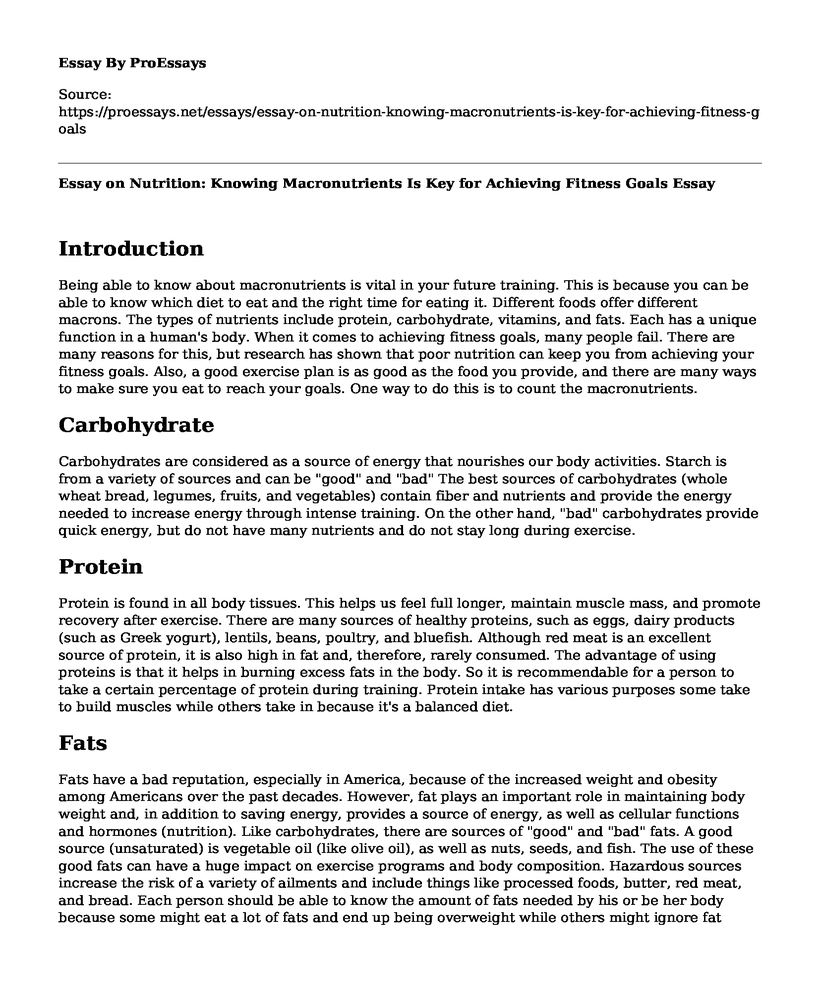Introduction
Being able to know about macronutrients is vital in your future training. This is because you can be able to know which diet to eat and the right time for eating it. Different foods offer different macrons. The types of nutrients include protein, carbohydrate, vitamins, and fats. Each has a unique function in a human's body. When it comes to achieving fitness goals, many people fail. There are many reasons for this, but research has shown that poor nutrition can keep you from achieving your fitness goals. Also, a good exercise plan is as good as the food you provide, and there are many ways to make sure you eat to reach your goals. One way to do this is to count the macronutrients.
Carbohydrate
Carbohydrates are considered as a source of energy that nourishes our body activities. Starch is from a variety of sources and can be "good" and "bad" The best sources of carbohydrates (whole wheat bread, legumes, fruits, and vegetables) contain fiber and nutrients and provide the energy needed to increase energy through intense training. On the other hand, "bad" carbohydrates provide quick energy, but do not have many nutrients and do not stay long during exercise.
Protein
Protein is found in all body tissues. This helps us feel full longer, maintain muscle mass, and promote recovery after exercise. There are many sources of healthy proteins, such as eggs, dairy products (such as Greek yogurt), lentils, beans, poultry, and bluefish. Although red meat is an excellent source of protein, it is also high in fat and, therefore, rarely consumed. The advantage of using proteins is that it helps in burning excess fats in the body. So it is recommendable for a person to take a certain percentage of protein during training. Protein intake has various purposes some take to build muscles while others take in because it's a balanced diet.
Fats
Fats have a bad reputation, especially in America, because of the increased weight and obesity among Americans over the past decades. However, fat plays an important role in maintaining body weight and, in addition to saving energy, provides a source of energy, as well as cellular functions and hormones (nutrition). Like carbohydrates, there are sources of "good" and "bad" fats. A good source (unsaturated) is vegetable oil (like olive oil), as well as nuts, seeds, and fish. The use of these good fats can have a huge impact on exercise programs and body composition. Hazardous sources increase the risk of a variety of ailments and include things like processed foods, butter, red meat, and bread. Each person should be able to know the amount of fats needed by his or be her body because some might eat a lot of fats and end up being overweight while others might ignore fat intake and remain underweight. So fats are important but at a certain level that could be recommended by a nutritionist.
Conclusion
In conclusion, most people usually prefer having a nutritionist. This helps them maintain their nutrients intake. The advantage of a nutritionist is that he helps you maintain fitness. Being able to know about micronutrients is not just enough since their some recommended levels that are needed by the body each day?
Cite this page
Essay on Nutrition: Knowing Macronutrients Is Key for Achieving Fitness Goals. (2023, Feb 11). Retrieved from https://proessays.net/essays/essay-on-nutrition-knowing-macronutrients-is-key-for-achieving-fitness-goals
If you are the original author of this essay and no longer wish to have it published on the ProEssays website, please click below to request its removal:
- Awareness of Light
- Dangerous Consumption: Is the Consumer or the Company to Blame?
- Paper Example on Multiple and Diverse Decision Goals
- Essay Sample on Anthropometry and Body Composition
- Essay on Assistive Technology: Enhancing Quality of Life for the Disabled
- Nursing Considerations for Acute & Chronic Asthma in Ethnic Patients - Essay Sample
- Essay Example on Washington DC: Booming Biomedical Research & Healthcare Hub







